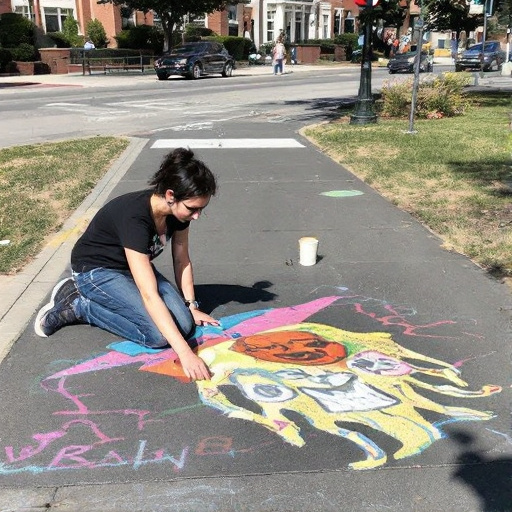Featured Articles
- "Chalk Art and Activism: How Campus Sidewalks Became a Canvas for Expression and Outrage"
- Quiet Quitting: The Unseen Impact of Minimalist Student Engagement on Campus Life Dynamics
- The Forgotten Art of Dining Hall Cuisine: A Culinary Exploration of Campus Life's Hidden Delights
- The Secret Life of Campus Pets: Uncovering the Furry Friends Behind Student Success Stories
- Top 6 Innovative Backpacks for Campus Life Revolutionizing Student Organization and Comfort Since 2019
The Secret Life of Campus Pets: Uncovering the Furry Friends Behind Student Success Stories
The Secret Life of Campus Pets: Uncovering the Furry Friends Behind Student Success Stories
The world of campus life isn't just about books, late-night study sessions, and social events; it's also about the furry companions who help students navigate their academic journeys. This article will explore the roles that pets play in fostering student well-being, the hidden stories behind these animal companions, and how they contribute to student success across various colleges and universities.
The Power of Pets: An Introduction
Did you know that approximately 70% of college students experience some form of stress during their academic careers? According to a study by the American Psychological Association, the presence of pets has been linked to decreased levels of cortisol, the stress hormone. With this background, it's no wonder that campuses across the country are increasingly embracing pets as a vital part of student success.
Stories of Success: Meet the Campus Pets
Let’s take a moment to meet some of the most beloved campus pets who have made their mark. One of them is “Bella,” a golden retriever who resides at State University. Bella is not just a pet; she’s an official therapy dog on campus, spending her days at the student center where students can drop by for some fur therapy. The impact is palpable: students often report feeling calmer and more focused after a short visit with Bella.
Another beloved figure is “Professor Paws,” a clever cat from Tech College. From her spot on the library’s windowsill, she gazes down at the students pouring over textbooks. Legend has it that anyone who pets Professor Paws will pass their exams—an amusing superstition that quickly became a cherished tradition among students.
Health Benefits of Having Pets in College
Surprisingly, studies suggest that having pets can significantly improve mental health. A 2019 survey conducted by the Human-Animal Bond Research Institute found that people with pets are 94% more likely to report feeling happy than those without. The connection between humans and animals can provide students with a sense of belonging and emotional support—both crucial for navigating the pressures of college life.
Creating a Supportive Environment
The growing trend of pet-friendly campus policies has resulted in universities becoming more welcoming to pets. Some institutions even host pet adoption events, allowing students to foster pets in need. These cuddly companions not only provide comfort but can also be integral to creating a more supportive campus environment. Imagine being able to sign up for “pet therapy” sessions during finals week: a dozen anxious students gathered in a room filled with playful puppies!
Case Study: The Therapy Dogs Program
Many colleges have implemented official therapy dogs programs, showcasing the positive effects of interaction with these animals. For instance, the University of Florida's Pet Therapy Program connects students with trained therapy dogs. A survey of participants showed that these interactions led to a 34% reduction in self-reported anxiety levels.
“When the world gets heavy, nothing seems to make it lighter than a wagging tail,” says Sarah, a psychology major who frequently visits the therapy dogs. “They remind us that it’s okay to take a break and enjoy life.”
Pet Personality Profiles: Bridging Connections
Cats, dogs, and even guinea pigs—each brings its unique charm that resonates with different personalities among students. Animal science major, Lisa, explains how her pet rabbit, “Thumper,” helps her foster connections. “Thumper is like my social glue,” she laughs. “He gets my friends talking, and before we know it, we’re all bonding over him instead of stressing about class!”
When Pets Go Virtual
The shift to online learning during the pandemic made many people seriously rethink the role of pets in education. An unexpected trend emerged: virtual pet therapy sessions. Students from all over were able to join in on Zoom calls featuring cute puppies and kittens, providing comic relief and emotional support during isolated months of studying. Digital pet therapy sessions had around 500 participants per week, proving that even virtually, furry friends can weave a sense of camaraderie and positivity into academic struggles.
Pets as Unofficial Therapists
There’s a saying among college students: “A pet is a student’s best friend.” This sentiment rings true because the day-to-day stressors of college life often lead students to rely upon their furry buddies for emotional support. The academic paper titled "Pets as Social Support: The Role of Companion Animals in Students' Lives," published in the Journal of College Student Development, finds that 78% of students with pets reported feeling less lonely compared to their petless peers.
Building Communities through Paws
Many campuses organize pet-centric gatherings, creating communities among students and their four-legged friends. These events often include pet parades, costume competitions, or puppy playdates. This burgeoning culture fosters friendships that translate into academic support systems. Who would have thought that a simple pup meetup could spark a lifelong friendship or a valuable study group?
The Takeaway: Pets and Their Role in Education
As student mental health continues to receive necessary attention, the role of pets cannot be underestimated. Having a furry friend can lead to improved well-being and success among students. Institutions and administrators should seriously consider fostering these connections. Incorporating pet-friendly policies or creating dedicated spaces for therapy animals shows that universities recognize the importance of holistic education.
Hoof it over to your campus services or student health department and see if there’s a local pet therapy program, or, even better, consider fostering a pet while you’re in school. You might just find your own furry friend nudging you to get out of your comfort zone and into that study group!
Conclusion: The Unseen Force Behind Student Success
In conclusion, campus pets play a far more significant role in a student’s journey than simply being adorable companions. They contribute to academic success by fostering community, alleviating stress, and promoting mental well-being. The next time you see a furry friend on campus, remember: behind each wagging tail or playful meow, there’s a profound story of student triumph and connection waiting to be uncovered.




